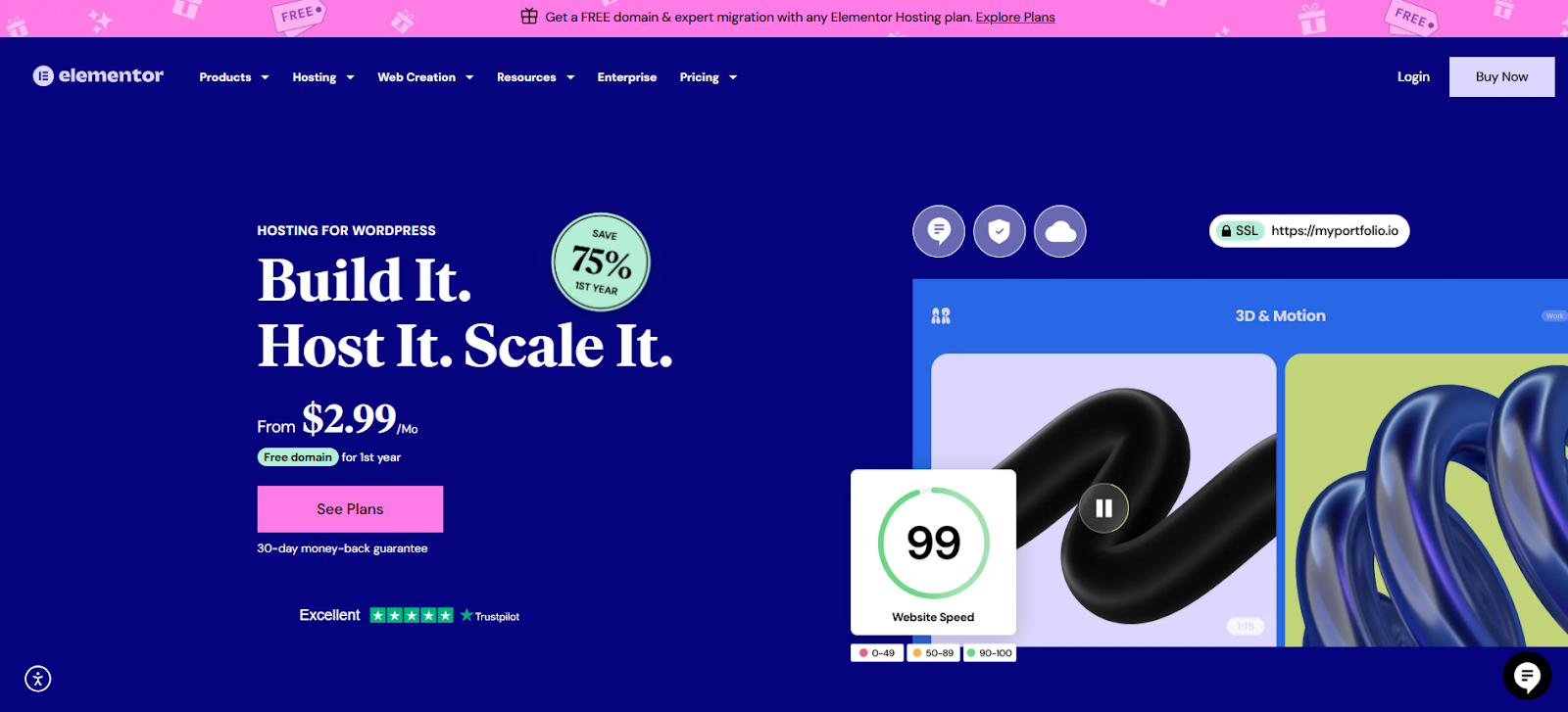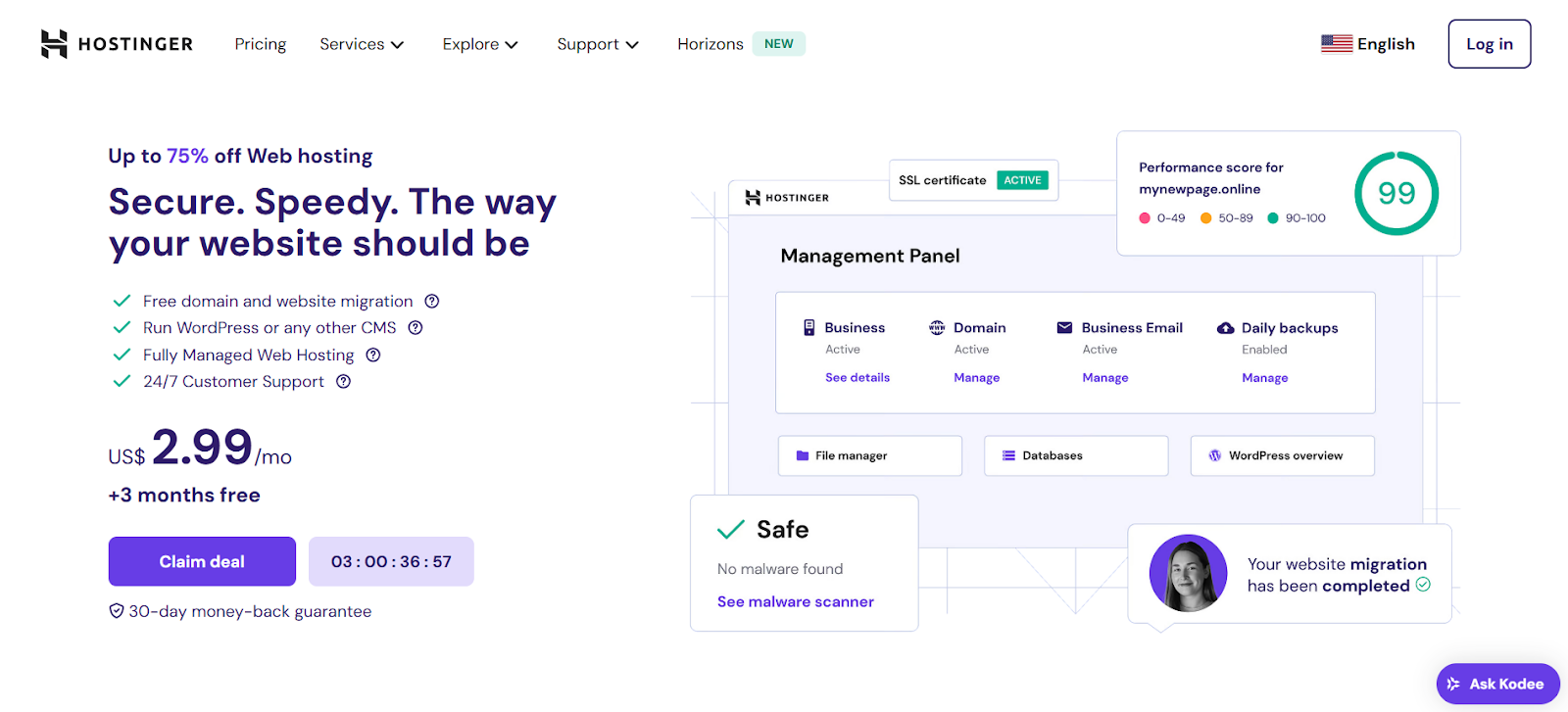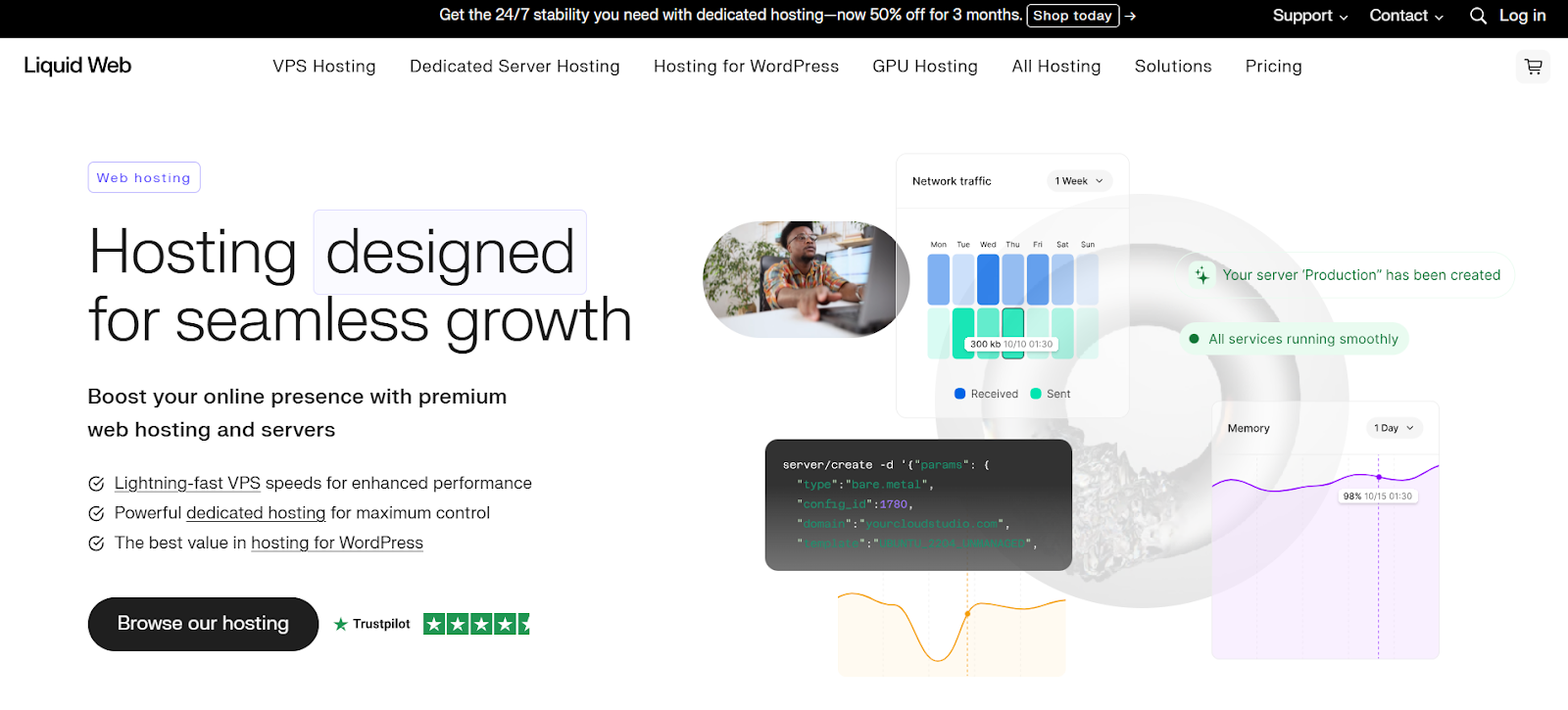Table of Contents
Let’s explore three popular choices: Hostinger, Liquid Web, and Elementor Hosting. We will look at what each offers to help you make an informed decision.
Hostinger vs Liquid Web vs Elementor Hosting
Making the right hosting choice depends heavily on your specific needs. Let’s break down what each of these providers brings to the table.
Elementor Hosting: All-in-One Solution for WordPress Websites
Elementor Hosting provides a managed WordPress hosting environment. It is specifically tuned for websites built using the Elementor page builder. This platform aims to simplify the process of launching and managing a WordPress site. You get hosting infrastructure optimized for performance and security.

Features:
- Managed WordPress hosting powered by Google Cloud Platform.
- Includes the free Elementor Core plugin pre-installed.
- Built-in caching features for faster load times.
- Free SSL certificate for security.
- Automatic daily backups and easy restoration.
- Staging environment for testing changes safely.
- Integrated Content Delivery Network (CDN) via Cloudflare.
- A dedicated support team is familiar with WordPress and Elementor.
Benefits:
- Streamlined setup for Elementor-based websites.
- Optimized performance for sites using the Elementor builder.
- Simplified management with hosting and builder elements considered together.
- Security features are managed for you.
Key Strengths:
- Seamless integration for Elementor users.
- Performance focus using Google Cloud’s infrastructure.
- Comprehensive support covering hosting and WordPress fundamentals.
Potential Considerations:
- Elementor Hosting includes the Elementor Core plugin. You need to purchase Elementor Pro separately if you require its advanced features.
- It’s primarily designed for WordPress sites using Elementor.
Who is it Best For? Elementor Hosting suits designers, developers, and business owners who build websites with Elementor. It works well if you want an integrated, optimized, and managed hosting solution without deep technical management.
Hostinger

Hostinger is known for offering a variety of hosting services at competitive price points. It caters to a broad audience, from beginners to more experienced users. It provides shared hosting, cloud hosting, and VPS plans.
Features:
- Multiple hosting types: Shared, WordPress, Cloud, VPS.
- Uses LiteSpeed web servers and caching for performance.
- Custom control panel (hPanel) designed for ease of use.
- Free SSL certificate included with most plans.
- Email accounts are included with hosting packages.
- Website builder option available.
- Regular backups on many plans.
- Global data center locations.
Benefits:
- Offers affordable entry-level hosting plans.
- User-friendly control panel simplifies site management.
- Provides a range of hosting options to scale with needs.
Key Strengths:
- Strong emphasis on affordability and value.
- Performance technologies like LiteSpeed are standard.
- Intuitive interface suitable for users of varying technical skills.
Potential Considerations:
- Support responses can vary during peak times.
- Resource limits on lower-tier shared plans might affect high-traffic sites.
Who is it Best For? Hostinger is a solid option for individuals, small businesses, and beginners looking for cost-effective hosting. It’s suitable for those who want an easy-to-use platform with good performance for standard websites.
Liquid Web

Liquid Web focuses on premium managed hosting solutions. It serves businesses and professionals who need high performance, reliability, and dedicated support. Its main offerings include VPSs, dedicated servers, and cloud solutions.
Features:
- Fully managed VPS, Cloud Dedicated, and Dedicated Server hosting.
- High-performance infrastructure with Service Level Agreements (SLAs).
- Choice of control panels (cPanel, Plesk, InterWorx).
- Proactive security measures and monitoring.
- Highly regarded 24/7/365 support (“The Most Helpful Humans In Hosting®”).
- Managed WordPress and WooCommerce-specific plans are available.
- Robust backup solutions.
- Staging environments included.
Benefits:
- Excellent performance and uptime reliability.
- Top-tier customer support is available around the clock.
- Comprehensive security features managed by experts.
- Scalable solutions for growing websites and applications.
Key Strengths:
- Industry-leading customer support and expertise.
- Focus on high-availability and performance-managed hosting.
- Strong security posture suitable for business-critical sites.
Potential Considerations:
- Pricing is higher compared to shared hosting providers.
- It may offer more resources than a small personal blog needs.
Who is it Best For? Liquid Web targets businesses, agencies, and professionals who require powerful, reliable managed hosting. It’s ideal for mission-critical websites, e-commerce stores, and applications where performance and support are paramount.
Grow Your Sales
- Incredibly Fast Store
- Sales Optimization
- Enterprise-Grade Security
- 24/7 Expert Service

- Incredibly Fast Store
- Sales Optimization
- Enterprise-Grade Security
- 24/7 Expert Service
- Prompt your Code & Add Custom Code, HTML, or CSS with ease
- Generate or edit with AI for Tailored Images
- Use Copilot for predictive stylized container layouts

- Prompt your Code & Add Custom Code, HTML, or CSS with ease
- Generate or edit with AI for Tailored Images
- Use Copilot for predictive stylized container layouts
- Craft or Translate Content at Lightning Speed
Top-Performing Website
- Super-Fast Websites
- Enterprise-Grade Security
- Any Site, Every Business
- 24/7 Expert Service

Top-Performing Website
- Super-Fast Websites
- Enterprise-Grade Security
- Any Site, Every Business
- 24/7 Expert Service
- Drag & Drop Website Builder, No Code Required
- Over 100 Widgets, for Every Purpose
- Professional Design Features for Pixel Perfect Design

- Drag & Drop Website Builder, No Code Required
- Over 100 Widgets, for Every Purpose
- Professional Design Features for Pixel Perfect Design
- Marketing & eCommerce Features to Increase Conversion
- Ensure Reliable Email Delivery for Your Website
- Simple Setup, No SMTP Configuration Needed
- Centralized Email Insights for Better Tracking

- Ensure Reliable Email Delivery for Your Website
- Simple Setup, No SMTP Configuration Needed
- Centralized Email Insights for Better Tracking

- Ensure Reliable Email Delivery for Your Website
- Simple Setup, No SMTP Configuration Needed
- Centralized Email Insights for Better Tracking
Selecting the Best Hosting Plan for You
Choosing the right hosting isn’t just about picking a provider. You need to match the plan to your specific requirements. Let’s look at key factors.
- Hosting Tuned for WordPress/WooCommerce: Does the host offer specific plans optimized for these platforms? Look for features like server-side caching, PHP version control, and expert WordPress support. This ensures better performance and easier management.
- Define Your Website’s Hosting Needs: Estimate your expected traffic levels. Consider your storage needs for files, images, and databases. What level of performance do you require? Answering these helps narrow down suitable plan types (shared, VPS, dedicated).
- Planning Hosting for Future Site Growth: Think about where your site might be in a year or two. Choose a host that allows easy scaling. Can you upgrade your plan seamlessly as your traffic grows? Scalability prevents migration headaches later.
- Managing Your Web Hosting Budget Wisely: Hosting costs vary significantly. Balance the features you need with your budget. Don’t just pick the cheapest option; consider the value offered in terms of performance, support, and reliability. What’s the real cost if your site goes down?
- Why Hosting Reliability & Uptime Matter: Uptime guarantees (SLAs) indicate a host’s confidence in their infrastructure. Consistent uptime is vital for user experience and SEO. Look for hosts with strong guarantees (e.g., 99.9% or higher).
- Faster Speeds with NVMe Server Storage: Newer NVMe SSDs offer much faster data access than older SATA SSDs or traditional hard drives. This translates directly to quicker website loading times. Check if your potential host uses NVMe storage.
- The Value of 24/7 Expert Hosting Support: Quick and knowledgeable support is invaluable when problems arise. Can you reach support easily via chat, phone, or email? Is support available 24/7? Look for providers known for helpful technical assistance.
- Need for an Easy-to-Use Control Panel: A control panel (like cPanel, Plesk, or a custom one like hPanel) lets you manage your hosting account. You’ll use it for tasks like setting up email, managing files, and checking site statistics. Ensure it’s intuitive and meets your technical comfort level.
Key Factors for Smooth Hosting Migration
Moving your website to a new host can seem daunting. Planning ahead makes the process much smoother. Consider these points.
- Understanding the Data Transfer Steps: Migration involves moving website files and databases. You’ll need to back up everything from your old host. Then, upload the files and import the database to the new host. Many providers offer tools or services to help.
- Handling Your Domain Name During Moves: You need to update your domain’s DNS records, which point your domain name to your new hosting server. This change can take some time to propagate globally (usually a few hours, sometimes up to 48).
- Choosing Where to Host Your Emails: Decide if you want to move your email accounts along with your website. You can keep your email with your domain registrar, use a third-party service, or host it with your new web host. Consider the implications for managing accounts and potential downtime.
- Tips to Prevent Downtime When Migrating: Plan your migration during low-traffic periods. Test the site thoroughly on the new host before updating DNS records. As a fallback, keep your old hosting active for a short period after the switch.
- Using Simple One-Click Migration Tools: Many hosting providers, especially those focused on WordPress, offer migration plugins or services. These tools can automate much of the transfer process, reducing complexity and potential errors. Check if your chosen host provides this assistance.
Boosting Site Performance on New Hosting
Once you’ve migrated, focus on optimizing your site’s speed on the new platform. Here’s how.
- Actionable Performance Tuning Tactics: Optimize your website beyond hosting. Compress images effectively. Minify CSS and JavaScript files to reduce their size. Leverage browser caching so returning visitors load pages faster.
- Using Caching & CDN for Faster Loading: Most quality hosts offer server-level caching. Utilize it! A Content Delivery Network (CDN) stores copies of your site’s static assets (images, CSS, JS) on servers worldwide. This delivers content faster to visitors based on their geographic location.
- Gains from Cloud Infrastructure Hosting: Hosting built on cloud platforms (like Google Cloud or AWS) often provides better scalability and reliability. Resources can adjust dynamically to handle traffic spikes, leading to more consistent performance.
- Essential Regular Maintenance Routines: Update your website software (CMS, plugins, themes). Optimize your database regularly to remove unnecessary data. Consistent maintenance prevents performance degradation over time.
Essential Web Hosting Security Measures
Website security is non-negotiable. Your hosting environment plays a significant role. Ensure these measures are in place.
- Securing Your Site with SSL and HTTPS: An SSL certificate encrypts data between your site and visitors. This is essential for trust and SEO. HTTPS should be enforced across your entire site. Most hosts offer free SSL certificates.
- Setting Up Your Hosting Firewall Rules: A Web Application Firewall (WAF) helps block malicious traffic before it reaches your site. For better protection, configure firewall rules specific to your application needs. Many managed hosts include WAF services.
- Performing Regular Security Checks: Use security scanning tools to check for malware and vulnerabilities. Many hosts offer built-in scanners. Regular scans help catch issues early.
- Backup Strategies & Disaster Recovery: Implement a reliable backup schedule (daily is recommended). Store backups offsite. Ensure you have a clear plan for restoring your site quickly if something goes wrong. Test your restore process periodically.
- WAF, DDoS & BotNet Defense Explained: Understand how these threats work. A WAF filters bad requests. DDoS mitigation absorbs large volumes of junk traffic. BotNet defense identifies and blocks automated malicious scripts. Quality hosts provide protection against these common attacks.
- Adding Multi-Factor Auth Security: Enable Multi-Factor Authentication (MFA or 2FA) on your hosting account and website admin logins. This adds a crucial layer of security beyond just a password.
- Importance of 24/7 Security Monitoring: Your host should continuously monitor its network and servers for threats. Proactive monitoring allows for rapid response to security incidents.
- Keeping Software Safe with Auto Updates: Where possible, enable automatic updates for your CMS core files (like WordPress) and plugins. This ensures security patches are applied promptly. However, always test updates on a staging site first if available.
- Secure Database & File Transfer Access: Use strong, unique passwords for database access. Utilize secure protocols like SFTP or SSH for file transfers instead of plain FTP. Limit file permissions to the minimum necessary.
- Automatic Security Patch Management: Good managed hosting providers often apply crucial server-level security patches automatically, protecting your site from vulnerabilities at the infrastructure level.
- Using Dev/Stage/Prod Environments Safely: Develop and test changes in separate development or staging environments. This prevents breaking your live (production) site. Ensure security practices are maintained across all environments.
- Benefits of Zero Handshake TLS Security: Technologies like TLS 1.3 offer improved security and performance benefits, including faster, more secure connections (Zero Round Trip Time Resumption). Check if your host supports the latest TLS versions.
What’s Next for the Web Hosting Industry
The hosting landscape continually evolves. Staying aware of trends helps you understand future possibilities.
- New & Upcoming Hosting Technologies: Expect advancements in server hardware, containerization (like Docker and Kubernetes) becoming more mainstream for flexible deployments, and edge computing bringing content closer to users for lower latency.
- Eco-Friendly Sustainable Data Centers: There’s a growing focus on energy efficiency and renewable energy sources for data centers. Green hosting options are becoming more common as providers aim to reduce their environmental impact.
- AI & Automation in Hosting Management: Artificial intelligence will play a bigger role in optimizing server performance, predicting hardware failures, enhancing security monitoring, and automating customer support tasks.
- Rise of Green Energy Hosting Servers: More hosts are committing to powering their operations with renewable energy like wind, solar, and hydroelectric power. This trend caters to environmentally conscious businesses and individuals.
Conclusion
Choosing the right web host is a foundational step for any successful website. Consider your specific needs carefully.
Think about your budget, technical expertise, performance requirements, and future growth plans. Evaluate factors like uptime reliability, customer support quality, security features, and ease of use.
For those building with WordPress, particularly with visual builders, finding a host that understands your toolkit can make a real difference. An environment optimized for your primary website components often leads to smoother development, better performance, and easier troubleshooting. Making an informed choice now sets your website up for success down the road.
Looking for fresh content?
By entering your email, you agree to receive Elementor emails, including marketing emails,
and agree to our Terms & Conditions and Privacy Policy.

